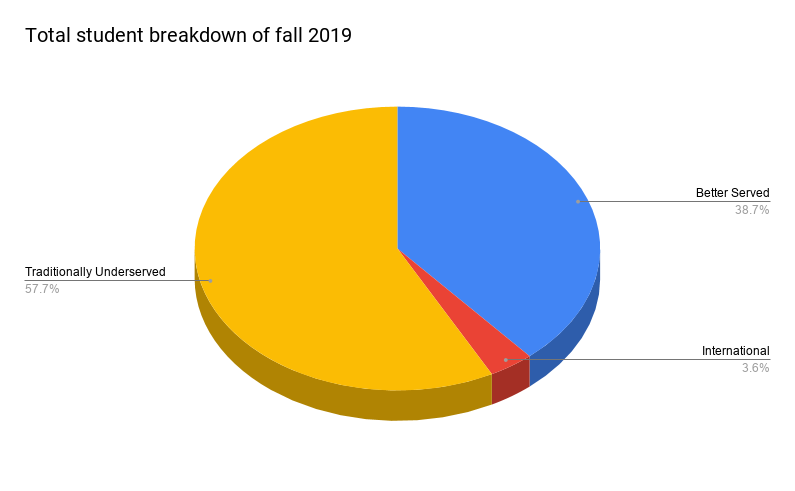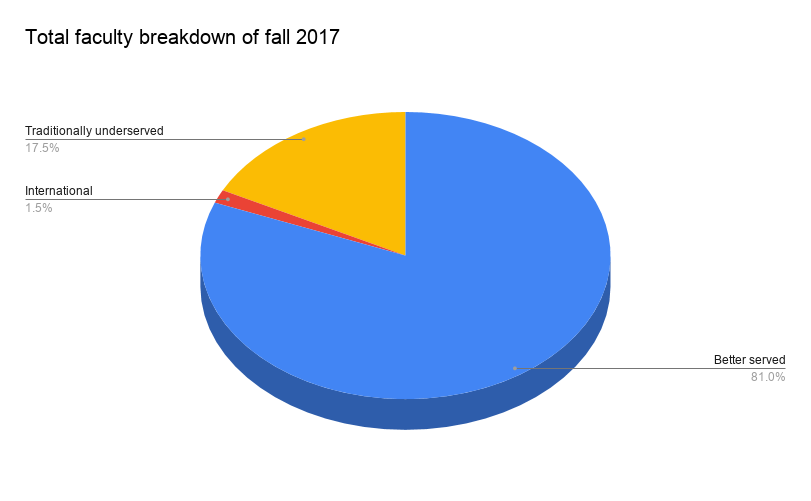Editorial: CSUN needs more diverse faculty that reflects the student body
Illustration by Joelena Despard
While CSUN has a diverse student population, its faculty population does not mirror that.
July 22, 2020
In 1968, students of color led strikes across California campuses, from San Francisco State University to CSUN, to demand the establishment of ethnic studies departments and to hire faculty of color to lead those departments. The fight to have faculty of color in universities continues today, as students and faculty push for diversity across all disciplines by vocalizing their demands to administrators.
CSUN’s diverse student population makes up the majority of the school’s population, with less than 22% of the population counting as white. However, the university still has a lot of work to do to have CSUN faculty reflect the student body.
CSUN should hire more diverse faculty with tenure-track positions in mind, pay more to adequately reflect their workload and contributions to the institution and provide structured support to foster a more inclusive environment.
The Sundial advocates for more diverse faculty, because we strongly believe having faculty of color benefits the institution overall, but more importantly students of color. By seeing themselves reflected in their professors, students will feel empowered and represented in the classroom.


While CSUN’s ethnic studies departments — of which the Chicana/o studies and Africana studies departments recently celebrated their 50th anniversary in fall 2019 — are tenants of diversity where many faculty of color have opportunities to be tenure-tracked, the same isn’t true for other departments.
The college of humanities holds the largest number of tenured and tenure-track traditionally underserved faculty of color, where the total headcount amounted to 45 as of 2017. In comparison, the David Nazarian college of business and economics had six. In the college of engineering and computer science, there were no tenured and tenure-track faculty of color from 2013 to 2017, according to CSUN Counts.
The hiring of faculty of color should not be pigeonholed to certain departments; diverse hiring should also occur across the departments, especially the departments of business, engineering and other STEM-related fields.

Multiple CSUN faculty members said faculty of color have pressure on them to teach larger courses and have service requirements such as mentoring and committee work. Jade C. Huell, an assistant professor from the department of communication studies, and Nate Thomas, a professor for the department of Cinema Television and Arts, both said they have carried the burden of mentoring their students of color, since they are one of the few faculty of color in their departments.
This extra labor is sometimes referred to as “invisible work” — work load carried by underrepresented faculty that is unrecognized and uncompensated.
“There are ways to include my extra work and commitments in my promotion evaluation materials for sure,” Huell said. “However, recognition and compensation rarely happens otherwise, not unless I actively apply to some award, grant or advocate for myself hard to administration. While the extra work is not a part of the job description per se, there is language in the job description about service, community engagement, etc. more generally. I think because of this vague clause, me and folx like me are just expected to do more. We do it anyway because we care about the students of color, the work and the communities we serve.”
This burden can be alleviated, in part, by hiring more faculty of color and keeping them as tenured faculty. But another issue is retainment.
“CSUN is just a really big place to feel lonely,” said Chief Diversity Officer Natalie Mason-Kinsey, referring to what she’s observed from faculty of color, since starting her position at CSUN in 2018. She says that faculty of color need to feel supported in their colleges and departments and that could help with retainment.
We believe implementing a college-wide mentoring program for senior faculty to support junior faculty of color – in addition to more hiring and better pay – can create a more welcoming, team-oriented culture focused on collaborative efforts. With a faculty-based support system behind them and an environment that values their contributions, faculty of color will be better equipped to fulfill their goals and support their students.
We are calling on departmental tenure committees to hire more tenure-track faculty of color that reflect the student body, but more than that, we are urging for a change in the culture to make sustainable progress. Our faculty of color deserve proper compensation and a mentoring program that makes them feel at home at CSUN.
Lastly, we are urging our peers, faculty, staff and administrators to vote yes on Proposition 16, which would restore affirmative action in California.
